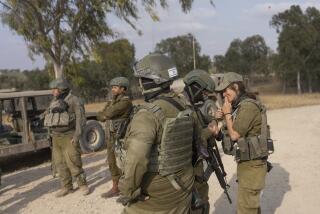Colombia, Ecuador end their standoff
- Share via
BOGOTA, COLOMBIA — A Latin American border crisis triggered by the Colombian military’s incursion into Ecuador to kill a rebel leader was apparently resolved Friday when Ecuadorean President Rafael Correa accepted his Colombian counterpart’s apology and promise not to repeat the transgression.
The handshakes among Correa, Colombian President Alvaro Uribe and Venezuelan President Hugo Chavez at a meeting of Latin American leaders in the Dominican Republic ended a tense week in which Ecuador and Venezuela each had deployed troops on their borders and broken diplomatic ties with Colombia.
“With [Colombia’s] promise not to threaten ever again its brother nation and the request for pardon, we can consider this grave incident as having been overcome,” Correa said in the summit’s afternoon session.
Uribe then crossed the conference hall to shake Correa’s hand, then that of Chavez, spurring applause. Chavez had added to the crisis by sending 9,000 troops as well as tanks and aircraft to Venezuela’s border with Colombia and by blocking nearly all commerce with the nation.
Chavez said he would “normalize” diplomatic relations with Colombia, reopen the border to trade and review his decision to deploy troops.
“We’re all of us happy. We must unite and integrate,” Chavez said afterward. Although no announcement was made Friday evening, it was assumed that Ecuador also would resume diplomatic relations with Colombia.
A joint communique issued by the so-called Rio Group Summit of Latin American Leaders emphasized regional harmony and rebuked Colombia for violating Ecuador’s sovereignty. It also noted that Correa had agreed to review electronic files taken from a laptop computer found at the rebel camp that Colombia alleged showed Ecuadorean officials had met with Raul Reyes, the rebel leader who was killed in the raid.
Uribe later said he would drop his threat to bring charges against Chavez at the International Criminal Court for allegedly harboring and supporting the Revolutionary Armed Forces of Colombia, or FARC, Colombia’s largest rebel group.
The crisis began Saturday after the Colombian military killed Reyes, the No. 2 man in the FARC, and 22 others at Reyes’ jungle camp a mile inside Ecuador. Four Mexican youths who were visiting the camp may be among the dead, Mexico’s Foreign Ministry said Friday
Colombia had said the raid was a case of “hot pursuit,” but Ecuadorean leaders alleged that it was planned, citing signs that Reyes’ camp was hit by as many as five “smart bombs” within a diameter of less than 55 yards.
The hostility continued through Friday morning, when Correa and Uribe traded verbal jabs during a morning session of the summit. Uribe accused Ecuador of complicity with terrorists, and Correa accused Uribe of playing the victim when it was neighboring countries, he said, that had been victimized by Colombia’s long-running civil war.
“Your insolence is doing more damage to the Ecuadorean people than your bombs,” Correa said, looking flustered.
The rhetoric was so harsh that it provoked reproof from other leaders
“We women are accused of being irrational and hysterical sometimes . . . but some of the scenes that we see here show that sometimes we are the most rational,” said Argentina’s president, Cristina Fernandez de Kirchner.
But the resolution during the afternoon session seemed to make most in the room happy.
Nicaraguan President Daniel Ortega announced he was reestablishing diplomatic relations with Colombia, one day after breaking them.
“The fiery rhetoric has subsided and economic interdependence has won the day,” said University of Miami political scientist Bruce M. Bagley via e-mail. “Nonetheless, there will be enduring diplomatic scars and ongoing distrust, mutual suspicions and recriminations for the foreseeable future. Uribe does not forgive easily and Chavez and Correa will not forget.”
Colombia announced more news Friday in its war against the FARC. It said Manuel Jesus Munoz, who like Reyes was a member of the FARC’s nine-member secretariat, had been killed by his own bodyguards in southwestern Caldas state.
The killers were motivated by a $5-million reward for Munoz, who was known as Ivan Rios, and the desire to surrender as army units closed in, Defense Minister Juan Manuel Santos told reporters. They brought Munoz’s hand, identity card and laptop computer to authorities this week, and the positive identification was announced Friday.
--
--
Times staff writer Hector Tobar in Mexico City and special correspondents Alex Renderos in San Salvador and Paul Rosero in Quito, Ecuador, contributed to this report.
More to Read
Sign up for Essential California
The most important California stories and recommendations in your inbox every morning.
You may occasionally receive promotional content from the Los Angeles Times.













